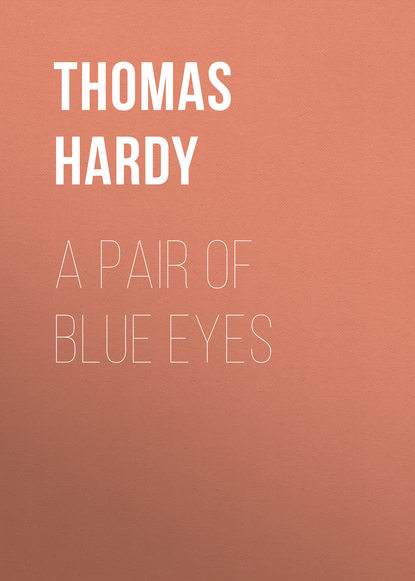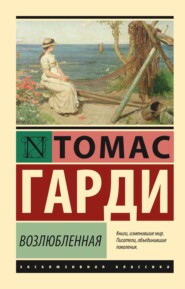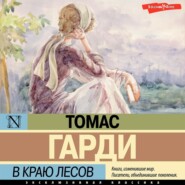По всем вопросам обращайтесь на: info@litportal.ru
(©) 2003-2025.
✖
A Pair of Blue Eyes
Настройки чтения
Размер шрифта
Высота строк
Поля
‘Yes. It seems that you are too,’ said Knight, strangely.
‘Yes.’
The selfishness of love and the cruelty of jealousy were fairly exemplified at this moment. Each of the two men looked at his friend as he had never looked at him before. Each was TROUBLED at the other’s presence.
‘I thought you said you were not coming till to-morrow,’ remarked Knight.
‘I did. It was an afterthought to come to-day. This journey was your engagement, then?’
‘No, it was not. This is an afterthought of mine too. I left a note to explain it, and account for my not being able to meet you this evening as we arranged.’
‘So did I for you.’
‘You don’t look well: you did not this morning.’
‘I have a headache. You are paler to-day than you were.’
‘I, too, have been suffering from headache. We have to wait here a few minutes, I think.’
They walked up and down the platform, each one more and more embarrassingly concerned with the awkwardness of his friend’s presence. They reached the end of the footway, and paused in sheer absent-mindedness. Stephen’s vacant eyes rested upon the operations of some porters, who were shifting a dark and curious-looking van from the rear of the train, to shunt another which was between it and the fore part of the train. This operation having been concluded, the two friends returned to the side of their carriage.
‘Will you come in here?’ said Knight, not very warmly.
‘I have my rug and portmanteau and umbrella with me: it is rather bothering to move now,’ said Stephen reluctantly. ‘Why not you come here?’
‘I have my traps too. It is hardly worth while to shift them, for I shall see you again, you know.’
‘Oh, yes.’
And each got into his own place. Just at starting, a man on the platform held up his hands and stopped the train.
Stephen looked out to see what was the matter.
One of the officials was exclaiming to another, ‘That carriage should have been attached again. Can’t you see it is for the main line? Quick! What fools there are in the world!’
‘What a confounded nuisance these stoppages are!’ exclaimed Knight impatiently, looking out from his compartment. ‘What is it?’
‘That singular carriage we saw has been unfastened from our train by mistake, it seems,’ said Stephen.
He was watching the process of attaching it. The van or carriage, which he now recognized as having seen at Paddington before they started, was rich and solemn rather than gloomy in aspect. It seemed to be quite new, and of modern design, and its impressive personality attracted the notice of others beside himself. He beheld it gradually wheeled forward by two men on each side: slower and more sadly it seemed to approach: then a slight concussion, and they were connected with it, and off again.
Stephen sat all the afternoon pondering upon the reason of Knight’s unexpected reappearance. Was he going as far as Castle Boterel? If so, he could only have one object in view – a visit to Elfride. And what an idea it seemed!
At Plymouth Smith partook of a little refreshment, and then went round to the side from which the train started for Camelton, the new station near Castle Boterel and Endelstow.
Knight was already there.
Stephen walked up and stood beside him without speaking. Two men at this moment crept out from among the wheels of the waiting train.
‘The carriage is light enough,’ said one in a grim tone. ‘Light as vanity; full of nothing.’
‘Nothing in size, but a good deal in signification,’ said the other, a man of brighter mind and manners.
Smith then perceived that to their train was attached that same carriage of grand and dark aspect which had haunted them all the way from London.
‘You are going on, I suppose?’ said Knight, turning to Stephen, after idly looking at the same object.
‘Yes.’
‘We may as well travel together for the remaining distance, may we not?’
‘Certainly we will;’ and they both entered the same door.
Evening drew on apace. It chanced to be the eve of St. Valentine’s – that bishop of blessed memory to youthful lovers – and the sun shone low under the rim of a thick hard cloud, decorating the eminences of the landscape with crowns of orange fire. As the train changed its direction on a curve, the same rays stretched in through the window, and coaxed open Knight’s half-closed eyes.
‘You will get out at St. Launce’s, I suppose?’ he murmured.
‘No,’ said Stephen, ‘I am not expected till to-morrow.’ Knight was silent.
‘And you – are you going to Endelstow?’ said the younger man pointedly.
‘Since you ask, I can do no less than say I am, Stephen,’ continued Knight slowly, and with more resolution of manner than he had shown all the day. ‘I am going to Endelstow to see if Elfride Swancourt is still free; and if so, to ask her to be my wife.’
‘So am I,’ said Stephen Smith.
‘I think you’ll lose your labour,’ Knight returned with decision.
‘Naturally you do.’ There was a strong accent of bitterness in Stephen’s voice. ‘You might have said HOPE instead of THINK,’ he added.
‘I might have done no such thing. I gave you my opinion. Elfride Swancourt may have loved you once, no doubt, but it was when she was so young that she hardly knew her own mind.’
‘Thank you,’ said Stephen laconically. ‘She knew her mind as well as I did. We are the same age. If you hadn’t interfered – ’
‘Don’t say that – don’t say it, Stephen! How can you make out that I interfered? Be just, please!’
‘Well,’ said his friend, ‘she was mine before she was yours – you know that! And it seemed a hard thing to find you had got her, and that if it had not been for you, all might have turned out well for me.’ Stephen spoke with a swelling heart, and looked out of the window to hide the emotion that would make itself visible upon his face.
‘It is absurd,’ said Knight in a kinder tone, ‘for you to look at the matter in that light. What I tell you is for your good. You naturally do not like to realize the truth – that her liking for you was only a girl’s first fancy, which has no root ever.’
‘It is not true!’ said Stephen passionately. ‘It was you put me out. And now you’ll be pushing in again between us, and depriving me of my chance again! My right, that’s what it is! How ungenerous of you to come anew and try to take her away from me! When you had won her, I did not interfere; and you might, I think, Mr. Knight, do by me as I did by you!’
‘Don’t “Mr.” me; you are as well in the world as I am now.’
‘First love is deepest; and that was mine.’
‘Who told you that?’ said Knight superciliously.
‘I had her first love. And it was through me that you and she parted. I can guess that well enough.’
‘Yes.’
The selfishness of love and the cruelty of jealousy were fairly exemplified at this moment. Each of the two men looked at his friend as he had never looked at him before. Each was TROUBLED at the other’s presence.
‘I thought you said you were not coming till to-morrow,’ remarked Knight.
‘I did. It was an afterthought to come to-day. This journey was your engagement, then?’
‘No, it was not. This is an afterthought of mine too. I left a note to explain it, and account for my not being able to meet you this evening as we arranged.’
‘So did I for you.’
‘You don’t look well: you did not this morning.’
‘I have a headache. You are paler to-day than you were.’
‘I, too, have been suffering from headache. We have to wait here a few minutes, I think.’
They walked up and down the platform, each one more and more embarrassingly concerned with the awkwardness of his friend’s presence. They reached the end of the footway, and paused in sheer absent-mindedness. Stephen’s vacant eyes rested upon the operations of some porters, who were shifting a dark and curious-looking van from the rear of the train, to shunt another which was between it and the fore part of the train. This operation having been concluded, the two friends returned to the side of their carriage.
‘Will you come in here?’ said Knight, not very warmly.
‘I have my rug and portmanteau and umbrella with me: it is rather bothering to move now,’ said Stephen reluctantly. ‘Why not you come here?’
‘I have my traps too. It is hardly worth while to shift them, for I shall see you again, you know.’
‘Oh, yes.’
And each got into his own place. Just at starting, a man on the platform held up his hands and stopped the train.
Stephen looked out to see what was the matter.
One of the officials was exclaiming to another, ‘That carriage should have been attached again. Can’t you see it is for the main line? Quick! What fools there are in the world!’
‘What a confounded nuisance these stoppages are!’ exclaimed Knight impatiently, looking out from his compartment. ‘What is it?’
‘That singular carriage we saw has been unfastened from our train by mistake, it seems,’ said Stephen.
He was watching the process of attaching it. The van or carriage, which he now recognized as having seen at Paddington before they started, was rich and solemn rather than gloomy in aspect. It seemed to be quite new, and of modern design, and its impressive personality attracted the notice of others beside himself. He beheld it gradually wheeled forward by two men on each side: slower and more sadly it seemed to approach: then a slight concussion, and they were connected with it, and off again.
Stephen sat all the afternoon pondering upon the reason of Knight’s unexpected reappearance. Was he going as far as Castle Boterel? If so, he could only have one object in view – a visit to Elfride. And what an idea it seemed!
At Plymouth Smith partook of a little refreshment, and then went round to the side from which the train started for Camelton, the new station near Castle Boterel and Endelstow.
Knight was already there.
Stephen walked up and stood beside him without speaking. Two men at this moment crept out from among the wheels of the waiting train.
‘The carriage is light enough,’ said one in a grim tone. ‘Light as vanity; full of nothing.’
‘Nothing in size, but a good deal in signification,’ said the other, a man of brighter mind and manners.
Smith then perceived that to their train was attached that same carriage of grand and dark aspect which had haunted them all the way from London.
‘You are going on, I suppose?’ said Knight, turning to Stephen, after idly looking at the same object.
‘Yes.’
‘We may as well travel together for the remaining distance, may we not?’
‘Certainly we will;’ and they both entered the same door.
Evening drew on apace. It chanced to be the eve of St. Valentine’s – that bishop of blessed memory to youthful lovers – and the sun shone low under the rim of a thick hard cloud, decorating the eminences of the landscape with crowns of orange fire. As the train changed its direction on a curve, the same rays stretched in through the window, and coaxed open Knight’s half-closed eyes.
‘You will get out at St. Launce’s, I suppose?’ he murmured.
‘No,’ said Stephen, ‘I am not expected till to-morrow.’ Knight was silent.
‘And you – are you going to Endelstow?’ said the younger man pointedly.
‘Since you ask, I can do no less than say I am, Stephen,’ continued Knight slowly, and with more resolution of manner than he had shown all the day. ‘I am going to Endelstow to see if Elfride Swancourt is still free; and if so, to ask her to be my wife.’
‘So am I,’ said Stephen Smith.
‘I think you’ll lose your labour,’ Knight returned with decision.
‘Naturally you do.’ There was a strong accent of bitterness in Stephen’s voice. ‘You might have said HOPE instead of THINK,’ he added.
‘I might have done no such thing. I gave you my opinion. Elfride Swancourt may have loved you once, no doubt, but it was when she was so young that she hardly knew her own mind.’
‘Thank you,’ said Stephen laconically. ‘She knew her mind as well as I did. We are the same age. If you hadn’t interfered – ’
‘Don’t say that – don’t say it, Stephen! How can you make out that I interfered? Be just, please!’
‘Well,’ said his friend, ‘she was mine before she was yours – you know that! And it seemed a hard thing to find you had got her, and that if it had not been for you, all might have turned out well for me.’ Stephen spoke with a swelling heart, and looked out of the window to hide the emotion that would make itself visible upon his face.
‘It is absurd,’ said Knight in a kinder tone, ‘for you to look at the matter in that light. What I tell you is for your good. You naturally do not like to realize the truth – that her liking for you was only a girl’s first fancy, which has no root ever.’
‘It is not true!’ said Stephen passionately. ‘It was you put me out. And now you’ll be pushing in again between us, and depriving me of my chance again! My right, that’s what it is! How ungenerous of you to come anew and try to take her away from me! When you had won her, I did not interfere; and you might, I think, Mr. Knight, do by me as I did by you!’
‘Don’t “Mr.” me; you are as well in the world as I am now.’
‘First love is deepest; and that was mine.’
‘Who told you that?’ said Knight superciliously.
‘I had her first love. And it was through me that you and she parted. I can guess that well enough.’

















